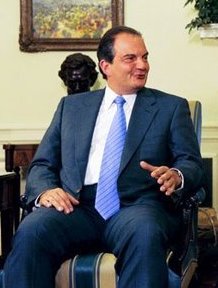This page is based on this
Wikipedia article Text is available under the
CC BY-SA 4.0 license; additional terms may apply.
Images, videos and audio are available under their respective licenses.
In politics, a red–green alliance or red–green coalition is an alliance of "red" parties with "green" parties. The alliance is often based on common left political views, especially a shared distrust of corporate or capitalist institutions. While the "red" social-democratic parties tend to focus on the effects of capitalism on the working class, the "green" environmentalist parties tend to focus on the environmental effects of capitalism.

The Coalition of the Left, of Movements and Ecology, commonly known as Synaspismos and abbreviated to SYN (ΣΥΝ), was a Greek political party of the radical New Left. It was founded in 1991 and was known as the Coalition of the Left and Progress until 2003. In 2004 SYN was a founding member of the Party of the European Left.

The Panhellenic Socialist Movement, known mostly by its acronym PASOK is a social-democratic political party in Greece.
This article gives an overview of liberalism in Greece. It is limited to liberal parties. The sign ⇒ denotes another party in that scheme. For inclusion in this scheme it isn't necessary so that parties labeled themselves as a liberal party.

Elections in Cyprus gives information on election and election results in Cyprus.
The Coalition of the Radical Left, mostly known by the syllabic abbreviation Syriza is a political party in Greece originally founded in 2004 as a coalition of left-wing and radical left parties.

Parliamentary elections were held in Greece on 19 August 1928. The result was a victory for the Liberal Party, which won 178 of the 250 seats.

The European Parliament election of 1999 in Greece for the election of the delegation from Greece to the European Parliament took place on June 13. The election system used in Greece was a party-list proportional representation with a 3% threshold for any party. The number of seats allocated to Greece was 25.
The Liberal Democratic Union was a coalition of six Greek political parties for the elections of 1956.
A political alliance, also referred to as a political coalition, political bloc, is an agreement for cooperation among different political parties on common political agenda, often for purposes of contesting an election to mutually benefit by collectively clearing election thresholds, or otherwise benefiting from characteristics of the electoral system or for government formation after elections. These may break up quickly, or hold together for decades becoming the de-facto norm, operating almost as a single unit.

The European Parliament election of 1989 in Greece for the election of the delegation from Greece to the European Parliament took place on June 15. The election system used in Greece was a party-list proportional representation. The number of seats allocated to Greece was 24.

A parliamentary election was held in Albania on 28 June 2009. No alliance achieved 71 deputies on its own needed to form a parliamentary majority, hence to form the new government the Democratic party and Socialist Movement for Integration joined forces.

Democratic Left is a social-democratic political party in Greece. DIMAR was a minority party supporting the Samaras cabinet from 21 June 2012 to 21 June 2013.

The June 2012 Greek legislative election was held in Greece on Sunday, 17 June, to elect all 300 members to the Hellenic Parliament in accordance with the constitution, after all attempts to form a new government failed following the May election. If all attempts to form a new government fails, the constitution directs the president to dissolve a newly elected parliament, and then to call for new parliamentary elections within 30 days of the dissolution. The president announced at 16 May the date for the new election, and signed the formal decree to dissolve the parliament and call for the election at 19 May.
E.PA.M (United Popular Front - Alternate Translation: United People's Front is a Greek political party founded in July 2011 by citizens who participated in the Indignant Citizens Movement and the anti-austerity demonstrations which accompanied the World Financial Crisis hitting especially hard on Greece as one of the first countries effected. E.PA.M. participated in the legislative elections of May 2012 as party of the coalition of "NO" with the Democratic Revival and gained 0.9%.
Having started as a citizens movement in July 2011, the first and founding congress of the party was held on April 8, 2012 and decided the founding declaration and the participation in the parliamentary elections of May 2012.

The January 2015 Greek legislative election was held in Greece on Sunday, 25 January, to elect all 300 members to the Hellenic Parliament in accordance with the constitution. The election was held earlier than scheduled due to the failure of the Greek parliament to elect a new president on 29 December 2014.
Democratic Coalition may refer to:

The Democratic Alignment, also translated as Democratic Coalition, is a political alliance in Greece.












